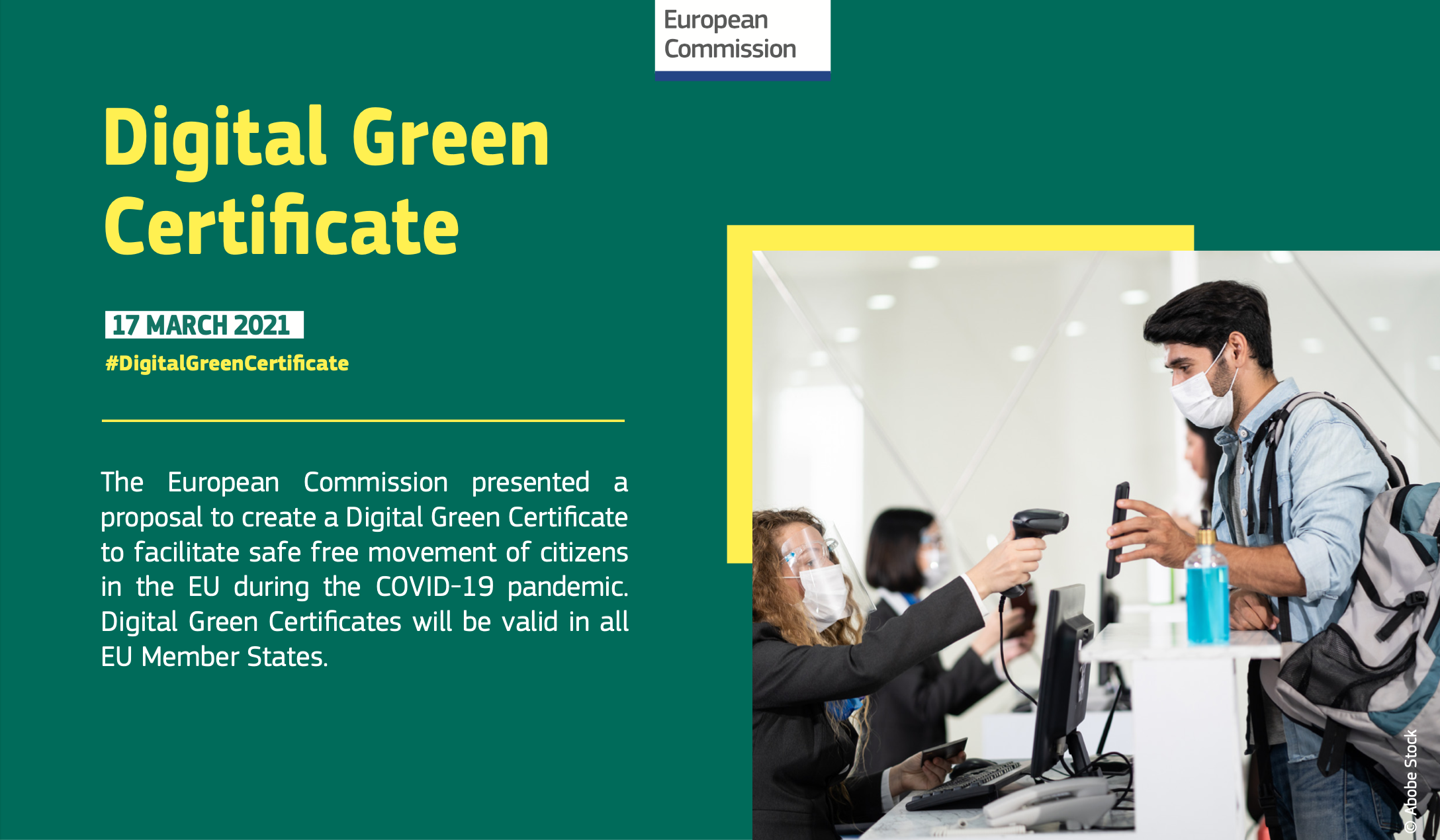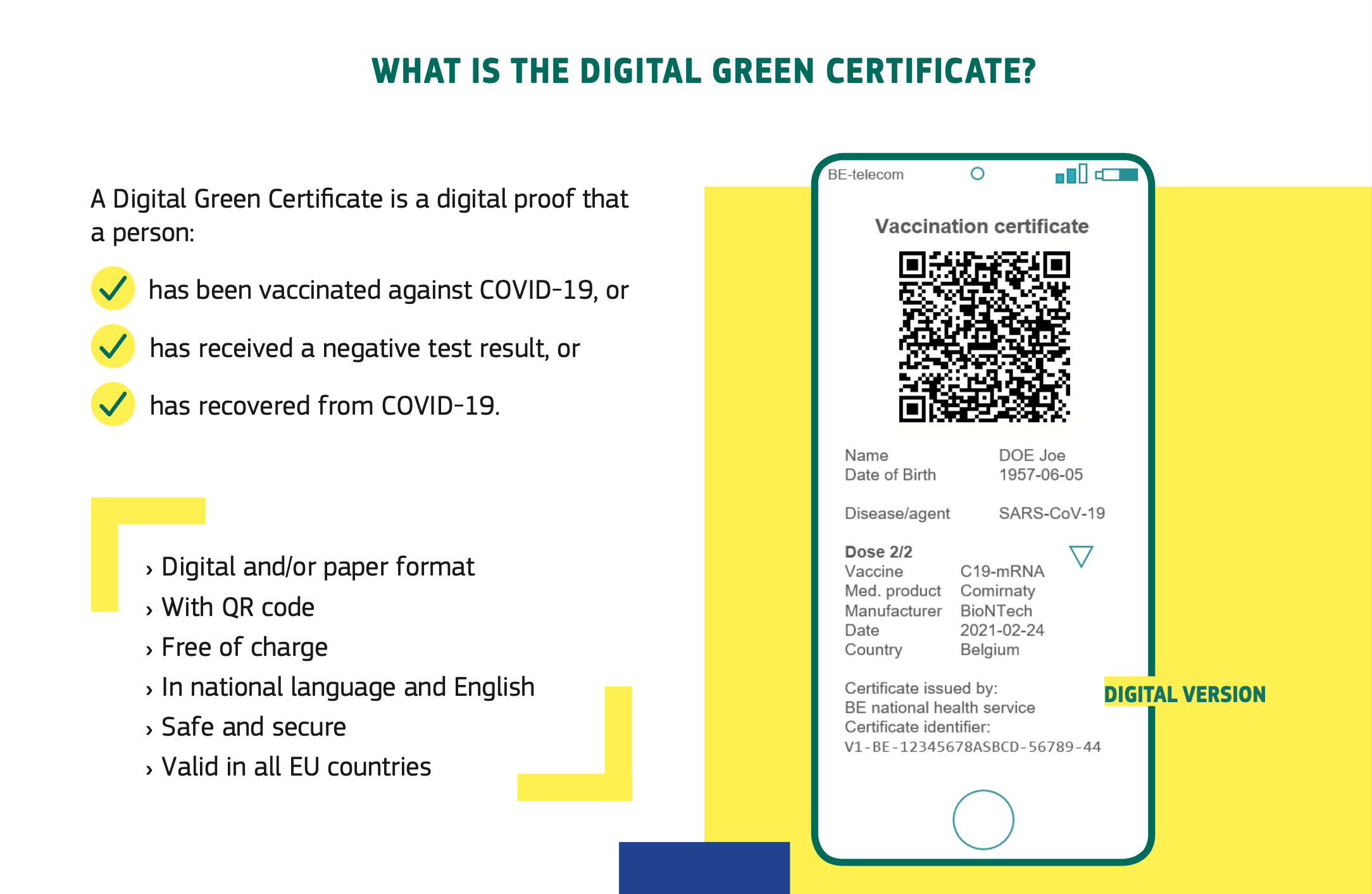One month after the Commission’s proposal for a Digital Green Certificate, Member States representatives in the eHealth Networkagreed on guidelines describing the main technical specifications for the implementation of the system. This is a crucial step for the establishment of the necessary infrastructure at EU level. In parallel Member States are encouraged to deploy the needed technical solutions at national level. It is of utmost importance to advance the work on the technical implementation, in parallel to the ongoing legislative process, to ensure a roll-out of Digital Green Certificates across the EU by June 2021.
The agreed technical specification covers data structure and encoding mechanisms, including the QR code, which will ensure that all certificates, whether digital or on paper, can be read and verified across the EU.
The guidelines also describe the EU gateway. Set up by the Commission, it will allow the sharing of electronic signature keys so that the authenticity of Digital Green Certificates can be verified across the EU. No personal data of certificate holders will pass through the gateway, as this is not necessary for the verification.
Finally, the guidelines describe reference implementations for software to issue Digital Green Certificates; a reference app to verify certificates; and a template for a wallet app for citizens to store them. While it will be for Member States to set up these systems at national level, the reference implementations will help speed up deployment as Member States will be able to build on them. The reference implementations will be open source and available by mid-May.
Members of the College said
Thierry Breton, Commissioner for Internal Market, said: “Today is a key milestone for setting up the Digital Green Certificate’s infrastructure at EU level. These guidelines, adopted unanimously by national experts, show Member States’ commitment and readiness and will provide them with the specifications necessary for a quick implementation. On the Commission’s side, we will be ready by 1 June and ready for Member States to connect, like this we can ensure that the system will be in place by the summer season. We stand ready to support Member States in their efforts to roll out the necessary technical infrastructure as soon as possible.”
Stella Kyriakides, Commissioner for Health and Food Safety, added: “This is an important step towards making the Digital Green Certificates a reality for citizens by the summer. With vaccinations taking place at an increasing pace across the EU, we are working relentlessly with Member States as we have committed to establish this infrastructure in an ambitious timeframe. They are crucial to assist the Member States in the fight against the pandemic while allowing citizens to exercise their free movement rights in a coordinated and safe manner.”
Didier Reynders, Commissioner for Justice, said: “This is an important step in the roll-out of the Digital Green Certificates. Last week, we welcomed the adoption of the negotiating mandate by the Council, we are now looking forward to next week’s vote in the European Parliament Plenary. We are on track towards our goal of having the certificate in place by June – to enable Europeans to travel safely this summer with minimum restrictions.”
Background
On 17 March, the Commission adopted a legislative proposalestablishing a common framework for a Digital Green Certificate.
On 14 April, the Council adopted its mandate to start negotiations with the European Parliament on the proposal. A vote of the European Parliament is expected soon, following its decision to adopt an urgent procedure. Once the Parliament adopts its mandate, the negotiations between the institutions can start.
In order to have Digital Green Certificates rolled out in June, the technical implementation has to advance in parallel to the legislative process. The technical specification guidelines adopted in the eHealth Network, a voluntary network connecting national authorities responsible for eHealth, are building on the close work of the Commission with the Member States. First guidelines had already been adopted in January and updated on 12 March, and a trust framework outline was agreed on 12 March 2021.
The next step on the technical side is now the set-up of national infrastructure, the roll-out of national solutions for issuing, verifying and storing Digital Green Certificates, and the set-up of the EU gateway. After a piloting phase in May, the EU gateway should be ready as of June for Member States to connect. A significant number of Member States expressed interest to participate in the pilot. The Commission will also provide technical and financial support to Member States to on-board the gateway.
The latest information on coronavirus measures as well as travel restrictions provided by Member States are available on the Re-open EU platform.
Previous Press Release 17th March 2021:
Today the European Commission is proposing to create a Digital Green Certificate to facilitate safe free movement inside the EU during the COVID-19 pandemic. The Digital Green Certificate will be a proof that a person has been vaccinated against COVID-19, received a negative test result or recovered from COVID-19. It will be available, free of charge, in digital or paper format. It will include a QR code to ensure security and authenticity of the certificate. The Commission will build a gateway to ensure all certificates can be verified across the EU, and support Member States in the technical implementation of certificates. Member States remain responsible to decide which public health restrictions can be waived for travellers but will have to apply such waivers in the same way to travellers holding a Digital Green Certificate.
Vice-President for Values and Transparency, Věra Jourová said: “The Digital Green Certificate offers an EU-wide solution to ensure that EU citizens benefit from a harmonised digital tool to support free movement in the EU. This is a good message in support of recovery. Our key objectives are to offer an easy to use, non-discriminatory and secure tool that fully respects data protection. And we continue working towards international convergence with other partners.”
Commissioner for Justice, Didier Reynders, said: “With the Digital Green Certificate, we are taking a European approach to ensure EU citizens and their family members can travel safely and with minimum restrictions this summer. The Digital Green Certificate will not be a pre-condition to free movement and it will not discriminate in any way. A common EU-approach will not only help us to gradually restore free movement within the EU and avoid fragmentation. It is also a chance to influence global standards and lead by example based on our European values like data protection.”
Key elements of the regulation proposed by the Commission today:
- Accessible and secure certificates for all EU citizens:
- The Digital Green Certificate will cover three types of certificates –vaccination certificates, test certificates (NAAT/RT-PCR test or a rapid antigen test), and certificates for persons who have recovered from COVID-19.
- The certificates will be issued in a digital form or on paper.Both will have a QR code that contains necessary key information as well as a digital signature to make sure the certificate is authentic.
- The Commission will build a gateway and support Member States to develop software that authorities can use to verify all certificate signatures across the EU. No personal data of the certificate holders passes through the gateway, or is retained by the verifying Member State.
- The certificates will be available free of charge and in the official language or languages of the issuing Member State and English.
- Non-discrimination:
- All people – vaccinated and non-vaccinated – should benefit from a Digital Green Certificate when travelling in the EU. To prevent discrimination against individuals who are not vaccinated, the Commission proposes to create not only an interoperable vaccination certificate, but also COVID-19 test certificates and certificates for persons who have recovered from COVID-19.
- Same right for travellers with the Digital Green Certificate –where Member States accept proof of vaccination to waive certain public health restrictions such as testing or quarantine, they would be required to accept, under the same conditions, vaccination certificates issued under the Digital Green Certificate system. This obligation would be limited to vaccines that have received EU-wide marketing authorisation, but Member States can decide to accept other vaccines in addition.
- Notification of other measures – if a Member State continues to require holders of a Digital Green Certificate to quarantine or test, it must notify the Commission and all other Member States and explain the reasons for such measures.
- Only essential information and secure personal data:
- The certificates will include a limited set of information such as name, date of birth, date of issuance, relevant information about vaccine/test/recovery and a unique identifier of the certificate. This data can be checked only to confirm and verify the authenticity and validity of certificates.
The Digital Green Certificate will be valid in all EU Member Statesand open for Iceland, Liechtenstein, Norway as well as Switzerland. The Digital Green Certificate should be issued to EU citizens and their family members, regardless of their nationality. It should also be issued to non-EU nationals who reside in the EU and to visitors who have the right to travel to other Member States.
The Digital Green Certificate system is a temporary measure. It will be suspended once the World Health Organization (WHO) declares the end of the COVID-19 international health emergency.
Next Steps
To be ready before the summer, this proposal needs a swift adoption by the European Parliament and the Council.
In parallel, Member States must implement the trust framework and technical standards, agreed in the eHealth network, to ensure timely implementation of the Digital Green Certificate, their interoperability and full compliance with personal data protection. The aim is to have the technical work and the proposal completed in the coming months.
Background
To comply with the measures to limit the spread of the coronavirus, travellers in the EU have been asked to provide various documents, such as medical certificates, test results, or declarations. The absence of standardised formats has resulted in travellers experiencing problems when moving within the EU. There have also been reports of fraudulent or forged documents.
In their statement adopted following the informal video conferences on 25 and 26 February 2021, the members of the European Council called for work to continue on a common approach to vaccination certificates. The Commission has been working with the Member States in the eHealth Network, a voluntary network connecting national authorities responsible for eHealth, on preparing the interoperability of vaccination certificates. Guidelines were adopted on 27 January and updated on 12 March, and the trust framework outline was agreed on 12 March 2021.
Today the Commission adopted a legislative proposal establishing a common framework for a Digital Green Certificate. The Commission also adopted a complementary proposal to ensure that the Digital Green Certificate is also issued to non-EU nationals who reside in Member States or Schengen Associated States and to visitors who have the right to travel to other Member States. Separate proposals to cover citizens and non-EU citizens are necessary for legal reasons; there is no difference in treatment of citizens and eligible non-EU citizens for the purpose of the certificates.
The latest information on coronavirus measures as well as travel restrictions provided to us by Member States are available on the Re-open EU platform.
For More Information
Digital Green Certificate – Technical Specification Guidelines
Digital Green Certificate – Press Release
Digital Green Certificate – Questions and Answers
Digital Green Certificate – Factsheet
Digital Green Certificate – video clip
Proposal for a Regulation on Digital Green Certificate to facilitate free movement in the EU
Coronavirus: a common path to Europe’s safe re-opening
European Commission’s coronavirus response website
Help support Cork Safety Alerts by becoming a member – Click Here


